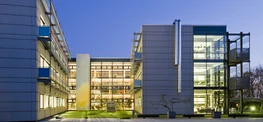The Max Planck Institute for Neurobiology of Behaviour – caesar (MPINB) is a neuroethology institute located in Bonn that studies how the collective activity of the vast numbers of interconnected neurons in the brain gives rise to the plethora of animal behaviors. Our research spans a large range of scales from the nano-scale imaging of brain circuitry, to large-scale functional imaging of brain circuitry during behavior, to the quantification of natural animal behaviors.
The Research Group Neural Circuits investigates the dynamics of neural circuits underlying behavior in Drosophila melanogaster. For this group we are offering a Postdoc position (m/f/d) in systems neuroscience.
We are looking for a highly motivated scientist interested in investigating neural circuits underlying behavior in the fruit fly Drosophila using advanced optical imaging and behavior techniques.
Available projects
Depending on your interests, a range of projects that investigate neural circuits underlying behavior are available, for example focusing on learning and memory or sleep. Our lab studies the brain of the fruit fly using two-photon calcium imaging and optogenetics in behaving animals. Over the last years, we have developed a number of advanced methods for optical microscopy, imaging and optogenetics, in particular in flies behaving in virtual reality, as well as for the quantification of behavior. These methods can now be applied for elucidating the computations of neural circuits in the brain.
What we expect from you
- A PhD in neuroscience, biophysics , physics, physical chemistry, engineering or related fields
- Good knowledge of programming languages for data analysis (Python, Matlab) and a strong interest in quantitative approaches for describing behavior and neural circuits
- Interest in computational modeling for data analysis, analysis of large data sets, as well as in using modern methods for data analysis, for example machine learning
- Interest in working with and understanding custom built scientific instruments
What we offer
- You will work in a multidisciplinary, international team
- Cutting-edge equipped laboratories with a range of novel behavior and imaging paradigms
- Salary in line with the Max Planck regulations
- Employee benefits, a family-friendly culture, and flexible working hours
The MPNB is committed to diversity and inclusion and is aiming to increase the percentage of women in areas where they are under-represented. We therefore explicitly encourage women to apply. Handicapped persons with comparable qualifications receive preferential status.
Application
Please apply only via our application tool.
If you have any further questions please contact: Dr. Johannes Seelig, johannes.seelig@mpinb.mpg.de.









